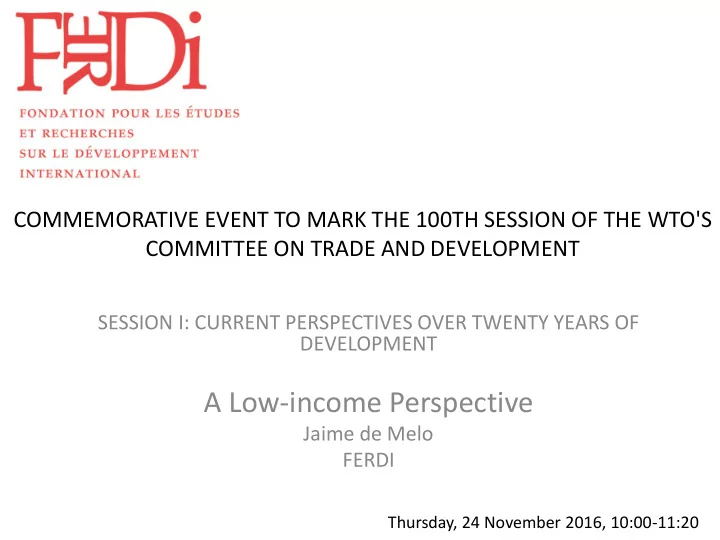

COMMEMORATIVE EVENT TO MARK THE 100TH SESSION OF THE WTO'S COMMITTEE ON TRADE AND DEVELOPMENT SESSION I: CURRENT PERSPECTIVES OVER TWENTY YEARS OF DEVELOPMENT A Low-income Perspective Jaime de Melo FERDI Thursday, 24 November 2016, 10:00-11:20
Outline • The Single Undertaking and • Special and Differential Treatment for LDCs • The Aid-for-Trade (AFT) Initiative and the Trade Facilitation Agreement (TFA) • Trade and the Environment: The Doha Round for “developing Countries and the Environment” • Looking Ahead: The Trade and Climate Regimes on a collision course: Green the GATT • Annex: The Economic Partnership Agreements (EPAs)
The Single Undertaking (SU) • WTO membership: Countries that engaged in the greatest amount of accession-driven trade liberalization (50 countries) experience the greatest amount of trade increases after joining while those that made little commitment to liberalization (65 former colonies with automatic accession under GATT) experience no trade increase • For LDCs, WTO SPS, IPRs, TRIPS, Customs valuation, were rules of the few, by the few for the few. Implementing these inappropriate commitments estimated to take up to a year’s budget for 8 of 12 LDC sample (Finger and Shuler (2000). EIF had not reached $10 million by 2007.
Special and Differential Treatment (SDT) SDT is "giving away with one hand (preferences) and taking away with another (restrictive RoO)" Not much preferential access given away because of preference erosion due to both falling tariffs but also to multiple PTAs by donors. (next slide) ---Rules of origin have been «business owned» rather than «business friendly» See AGOA slide. Textiles & Apparel 10-15% MFN tariff for US and EU so ample room for preferential margin. US had triple transformation rule and EU double transformation rule. AGOA (and Jordan) benefitted from move to Single Transformation Rule (SR). EU now moved to SR in 2011 for LDCs (see slide) …but at 2015 ministerial in Nairobi, the use of materials not originating from an LDC can now make up to 75 percent of the final value of a product for it to qualify for preferential treatment.
Preference Erosion for LDCs Adjusting for preferences to non-LDC partners at the tariff line level results in negative preferences for the US
Rules of Origin (AGOA) About 10% preference margin for both US and EU but AGOA granted the Single transformation rule (SR) in 2001 while the EU kept the double transformation rule
Textiles and Apparel Rules of Origin (EU) EU moved to Single transformation Rule in 2011 for LDCs (but not for other developing countries)
Utilization rates Jordan exports (2016) US: Single transformati on T&A for Jordan only EU: Same RoO for all partners Details here http://www.ferdi.fr/en/publication/p169-improving-eu-market-access-jordanian-exports
The Aid-for-Trade (AFT) Initiative and the Trade Facilitation Agreement (TFA) • AFT initiative (2005). To the rescue of the stalled Doha Round. Pressures for accountability as funds were drying up turned evaluation into a ‘beauty contest’ …and to projects on a Xmas tree with an expanding agenda difficult to evaluate through the biennial OECD- WTO reviews. Details and case studies here http://www.ferdi.fr/en/node/1626 • TFA (1993) (only item on Doha agenda with all-round support) : A welcome refocus of AFT with a call for technical assistance to the LDCs to reduce trade costs at customs. An Opportunity to bolster AFT by with hope of delivering ‘value -for- money’ (satisfies MRV). http://www.brookings.edu/research/opinions/2014/07/01-trade- facilitation-agreement-de-melo
Trade and the Environment WTO is a negative Integration Contract GATT,GATS: individual countries can choose their own environmental policies (so long as they don’t discriminate). Only restrictions on behavior is to prevent members from reneging on exchange of market access What members can do (BTA) and cannot do (environmental subsidies). For labelling unclear but case law on likeliness can be overturned. Very slow progress on the negotiations on the Environmental Goods Agreement (EGA) and during Doha, countries could not agree on a list and always excluded EGs with a tariff peak !!!
Green the WTO: Move to a positive contract Obligation to address environmental damage. This involves harmonizing customs classification via WCO Allow for ‘green’ subsidies (re -instate art. 31 SCM). Potential abuse, but would ease transition to green ppms. Fossil fuels. Compulsory monitoring of subsidies for fossil fuels. This wouldl be equivalent of currently compulsory TPRM. (currently the supply of similar information is disincentivizing). Legalize environmental labelling (now uncertain under case law) - via recourse to ISO standards. Using an ISO std. guarantees immunization from challenges at the WTO.
References Cadot, Olivier, and Jaime de Melo eds. (2015) Aid for Trade: What have we Learnt? Which Way ahead ? http://voxeu.org/content/aid-trade-what-have-we-learnt-which-way-ahead What Will the Trade Facilitation Agreement Mean for the Aid for Trade Agenda? New e- book Provides Answers http://blogs.worldbank.org/trade/what-will-trade-facilitation-agreement-mean-aid-trade- agenda-new-e-book-provides-answers Finger, Michael and P. Shuler (2000) “Implementing the Uruguay Round: The Development Challenge”, The World Economy, 23(4), 511 -25. Guillaumont, Patrick (2009) Caught in a Trap: Identifying the Least Developed Countries , ECONOMICA Mavroidis, Petros and Jaime de Melo (2015) “Climate Change policies and the WTO: Greening the GATT, Revisited ” http://voxeu.org/content/towards-workable-and-effective- climate-regime The State of Climate-related negotiations: modest steps in the right direction http://www.voxeu.org/article/state-climate-negotiations
ANNEX The Economic Partnership Agreements (EPAs) EPAs : A sideshow for he EU’s trade policy. EU-Cariforum (2007) only full agreement so far : Access without entry (movement of unskilled workers but entertainers and cultural practitioners without a university degree will require certification to perform). Expect no further integration of African economies to come out of EPAs (e.g. EAC may get tougher ROO to protect itself from imports and services are excluded and implementation periods are often over 20 years periods). Details here. http://www.voxeu.org/article/eu-trade-deals-developing-nations- missed-opportunities
Recommend
More recommend